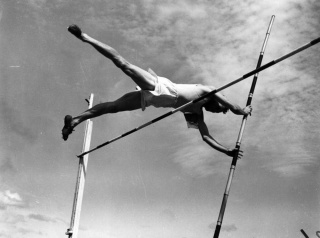Sport Informatics and Analytics/Course description
Course name: Sport Informatics and Analytics
This course explores the links between informatics and analytics in sport contexts. It is a course in the sense used by the OERu to widen access to more a affordable education for all who want to engage in online learning whilst reflecting in and on personal practice.[1]
Contents
Course metrics
- Notional learning hours: 150 hours.
- Duration: learner defined.
- Assessment: formative and summative assessment of an ePortfolio.
- Formal credit option: yes.
- Course: this is a stand alone course.
- Level: Masters.
What is it about?
This is an OERu course in Sport Informatics and Analytics. It is a Masters level course.
The content shared here was developed by staff at the University of Canberra, Australia, for an open, online course in February 2015. It was included in the University of Canberra's Master of High Performance Sport for the first cohort of students in the 2015 academic year. The content of the course is updated continuously and has been available as an OERu course since 2016. Throughout the course we add, when available, the growing volume of resources available in this practice and research space in performance.
What will you learn?
This course explores the links between informatics and analytics in sport contexts at a time of growing interest in the observation and analysis of sport performance. The course explores four themes. The learning outcomes for this course can be found on this page of the course.
What is involved?
This course offers opportunities to follow the content in a linear or non-linear way. We acknowledge that as a learner you will make decision about your interests within the course content. We provide a range of resources to support your self-regulated learning journey[2][3][4]. It takes place at a time of growing interest in sport informatics and analtycs and a flourishing of different roles and occupations.[5][6][7][8]
We have planned the course with Jo Ito's observation in mind: "education is what people do to you and learning is what you do to yourself".[9]
To this end, as this course has evolved, we have become more interested in the macrolearning[10][11] and backwards design opportunities it offers to the learning central to Joi's thinking. Mine Cetinkaya-Rundel (2018)[12] provided a detailed account of backwards design. She observed:
In this talk we introduce a course design approach inspired by backwards design, where students are exposed to results and findings of a data analysis first and then learn about the building blocks of the methods and techniques used to arrive at these results. We present this approach in the context of an introductory data science course that focuses on exploratory data analysis, modeling, and effective communication, while requiring reproducibility and collaboration.[13]
You can find an example of a course outline on this Google site.
What prerequisites?
This course is designed for people who work in sport performance environments or who aspire to do so. We anticipate that the content here might be of interest to a wider audience for whom sport is an important part of their lives. Although we introduce some basic ideas around statistics and visualisation, no prior knowledge is expected in the planning of the course content.
How long does the course take?
The study time for this course is estimated to be 150 hours. However, we anticipate learners will take as long as they need to satisfy their interests in this course.
What credit options are available?
The University of Canberra offers an opportunity for students to gain a credit for this course through the submission of an electronic portfolio (ePortfolio). Information about the ePortfolio requirements for this course can be found on this course page .
Course outline
There are sixteen topics in this course. These are planned within the context of four themes (T1, T2, T3 and T4). These topics can be studied as weekly activities or in much more intensive periods of study. Note that topics 5, 10 and 16 relate directly to the ePortfolio assessment of this course.
- Introductions (T1).
- Pattern recognition (T2).
- Performance monitoring (T3).
- Audiences and messages (T4).
- Compile and submit Introduction ePortfolio.
- Ethical issues (T1).
- The quantified self (T3).
- Using R (T2).
- Python (T2)
- Visualising data (T4).
- Compile and submit Development ePortfolio.
- Feedforward (T4).
- Communities of Practice (T1).
- Knowledge Discovery (T2).
- Informatics and Analytics (T1, T2, T3, T4).
- Refine, complete and submit Final ePortfolio.
Learning outcomes
ePortfolio
Web resources
References
- ↑ Schön, Donald (2012). "The reflective practitioner: How professionals think in action". https://www.researchgate.net/scientific-contribution/20730362_Donald_A_Schoen. Retrieved 13 June 2019.
- ↑ Zimmerman, Barry (1990). "Self-regulated learning and academic achievement: An overview". Educational Psychologist 25(1): 3-17.
- ↑ Kizilcec, Rene; Perez-Sanagustín, Mar; Maldonado, Jorge (2017). "Self-regulated learning strategies predict learner behavior and goal attainment in Massive Open Online Courses". Computers in Education 104: 18-33.
- ↑ Downes, Stephen (23 February 2018). "Why personal learning?". http://www.downes.ca/presentation/487. Retrieved 5 March 2018.
- ↑ Buchheit, Martin (June 2019). "Cowboys, Chaos and Coyotes". https://martin-buchheit.net/wp-content/uploads/2019/06/Key-Takeaways-for-Martin-Buchheit_final2.pdf. Retrieved 19 June 2019.
- ↑ Gregory, Sam (15 May 2019). "Getting into Sports Analytics". https://medium.com/@GregorydSam/getting-into-sports-analytics-ddf0e90c4cce. Retrieved 19 June 2019.
- ↑ City, Manchester (June 2019). "Data and Development". https://mediacdn.mancity.com/-/media/data-and-development-1st-team-performance-analyst-jd.ashx?la=en. Retrieved 19 June 2019.
- ↑ Ley, Tobias (18 June 2019). "Knowledge structures for integrating working and learning: A reflection on a decade of learning technology research for workplace learning". British Journal of Educational Technology https://doi.org/10.1111/bjet.12835.
- ↑ Ito, Joi (July, 2014). "Want to innovate? Become a "now-ist"". http://blog.ted.com/instead-of-futurists-lets-be-now-ists-joi-ito-at-ted2014/. Retrieved 14 March 2016.
- ↑ Lyons, Keith (15 May 2019). "Microcontent: triads, facilitators and a micro-campus". https://keithlyons.me/blog/2019/05/15/microcontent-triads-facilitators-and-a-micro-campus/. Retrieved 17 June 2019.
- ↑ Jahnke, Isa et al (23 May 2019). "Unpacking the Inherent Design Principles of Mobile Microlearning". https://doi.org/10.1007/s10758-019-09413-w. Retrieved 17 June 2019.
- ↑ Cetinkaya-Rundel, Mine (9 November 2019). "Let them eat cake (first)!". https://speakerdeck.com/minecr/let-them-eat-cake-first. Retrieved 17 June 2019.
- ↑ Cetinkaya-Rundel, Mine (9 November 2019). "Let them eat cake (first)!". https://speakerdeck.com/minecr/let-them-eat-cake-first. Retrieved 17 June 2019.
